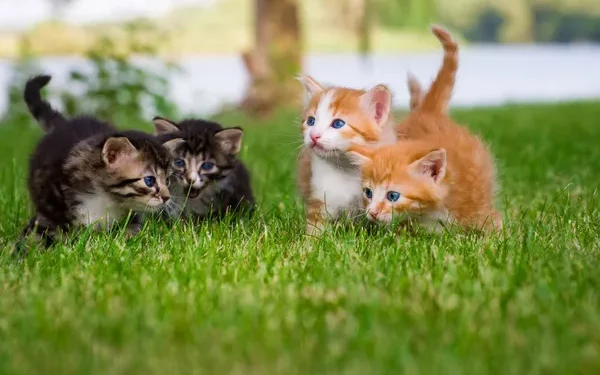Last Updated on March 10, 2023 by Flavia Calina
Kittens grow too soon, so if you want to experience the pleasure of being around baby cats and fostering them, then do it while it lasts. Being aware of the different kitten development stages allows you to stay prepared to raise strong and healthy fur babies.
Taking care of a litter of newborns is no joke because every task is multiplied many more times, be it feeding, helping it poop, playing, litter box training, and much more. Plus, unplanned vet visits can bring hefty medical bills for which you may have to be prepared ahead of time.
Cheap pet insurance assures a furball basic health benefits during dire health situations and medical emergencies. Consider purchasing pet insurance for cats so that getting your litter medical assistance need not be a significant financial challenge in needy times of health.
In the meantime, read this article to learn about the main stages of kitten development so that ensuring your tiny fur babies have a happy and healthy life is much easier.
1.Neonatal phase (Newborn – 2 Weeks)
Newborn cats entirely depend on their mother cats, without whose assistance they will not be able to regulate body temperature. Plus, their senses will not be active yet, and they can pee or poop only when stimulated by their mother cat. Hence, a new litter should spend the first few weeks of their lives with its mother. This way, the kittens can thrive and learn how to interact with one another and humans. Socialized kittens can be very friendly and are adoptable.
2.Socialization phase (2 Weeks – 7 Weeks)
At the end of two weeks, the kitten’s eyes will slowly begin to open; however, the vision may not be clear just yet. The kitten’s senses will continuously develop in the following weeks. Hearing, eyesight, smell, and taste will improve by about five weeks. Keep an eye out for the baby teeth emerging by the fourth week. During this phase, the kittens will learn to walk, socialize, play, groom, and develop other skills necessary for survival. By the end of seven weeks, the baby cats begin to wean off of their mother cat’s milk and become interested in soft food formulated for kittens. This is also an ideal time to start with litter training.
3.Exploratory phase (7 Weeks – 12 Weeks)
During this phase, your kittens will be more than willing to explore new things in the surroundings and can be more playful than they were in the earlier phase. Amp up the level of interactions between the littermates, so they enjoy each other’s company and grow up to become confident, lovable, and well-adjusted felines. By this time, the baby cats should be fully weaned and nibbling on solid food on their own.
4.Independent phase (3 Months – 6 Months)
Your kittens will have gotten much bigger and become more aggressive during play and interactions by the end of this phase. They will focus more on exploring the environment and establishing a hierarchy with the litter members, other pets, and humans in the house. At this stage, it is vital to assert to the fur babies that you are the boss and consider spaying/neutering them.
With all this information in hand, it can be a lot easier to tackle young kittens in the household. At the same time, consider being prepared with pet insurance for cats so that handling unanticipated health scenarios need not be financially overwhelming. Cheap pet insurance policies can be affordable and allow you to provide timely medical care for covered health conditions. Contemplate purchasing a policy to lower your economic stress during dire health circumstances.
Also Read Interesting Articles At: Today World Info .











